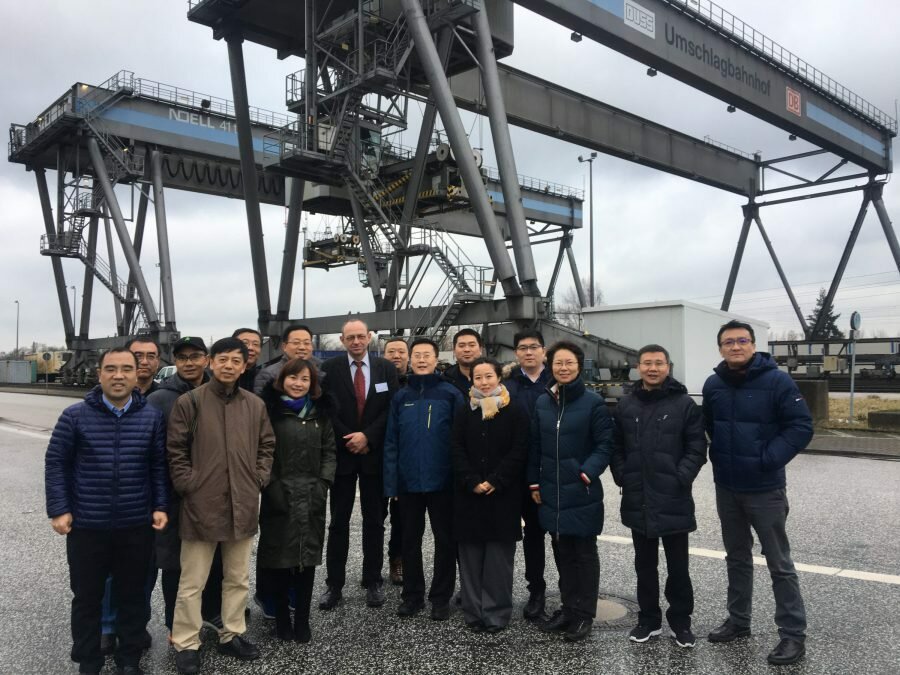Intermodal freight transport (combined transport) is one pillar of the shift approach within climate action strategies to make freight transport and logistics greener and more sustainable, thus effectively meet the targets of the Paris Agreement. Using combined transport means shifting road freight transport to more CO2 efficient modes such as rail or waterborne transport and therefore significantly reduces CO2 emissions and the energy consumption per loading unit. With growing freight volumes – not only in China but also in Germany and many other economies around the globe – and the shift away from large-scale bulk goods towards the small-scale cargo of higher value goods, all stakeholders in the logistics chain are challenged to optimize their operation and resource allocation to provide a sustainable and competitive service. To promote intermodal freight transport especially policy makers, infrastructure providers and managers, railway undertakings, combined transport operators, terminal operators as well as road haulage…
The 3rd Annual Conference of the China EV100 Forum was held from 14th – 15th January 2017 in Beijing. This year’s forum theme was “Upgrade Core Technology, Innovation Leads the Future”. Ministers from different government bodies, decision makers from local governments, think tanks, research institutes and relevant industries discussed the development strategies, policies and the future market development of EVs in China. The main discussion topics can be summarized as follows: Market Development China is the largest EV market in the world with a total fleet of around 1 Million NEVs and 517.000 produced in 2016 (+50% compared to 2015). Experts agree that the market preparation phase is finished and the accelerated irreversible uptake of E-Mobility will now begin. The goal in China is to bring 80 Million NEVs on the streets and with a NEV share of 40% in the new sales by 2030. Technology Development The Chinese government pursues…
Supported by the Deutsche Gesellschaft für Internationale Zusammenarbeit (GIZ) GmbH and the Shanghai Municipal Transportation Commission, the “New Energy Transportation International Forum”, co-hosted by Shanghai Transportation Trade Association and Shine Consultant, was successfully held in Shanghai on 10th and 11th January 2017. Mobility and transport are the backbone of a country’s society. From a global perspective, the entire transportation sector (passenger and freight transport) is responsible for nearly one quarter of all CO2 emissions. Even though countries such as Germany, for example, achieved significant efficiency improvements in the past (e. g. reduction in CO2 emissions per kilometer of passenger cars), the total greenhouse gas emissions within the sector have barely dropped due to an extensive rise in transport performance. This partially repeals the improvements already achieved in climate and environmental protection and shows that the absolute contribution to climate protection and the proportion of renewable energy use in the transport sector…
The pressure on policy makers in China to increase the efficiency of freight transport is high. A high dependency of the freight transport sector on imported fuels, major concerns of transport-related air pollution and continuously growing carbon dioxide emissions exacerbate the pressure. Currently, the freight sector is developing towards an unsustainable direction. The modal share of rail transport halved between 2004 and 2014 while the share of road freight transport tripled. Neither waterway nor rail transport are at this stage competitive to the road sector in terms of speed, flexibility, accessibility and reliability. The rail network is utilized to a large extent to transport mass goods such as steel and coal. Both the infrastructure and railway operation of the railway transport are designed to transport bulk rather than provide intermodal solutions for containers. The consequences are severe: the freight transport caught up with the road passenger sector in terms of…
